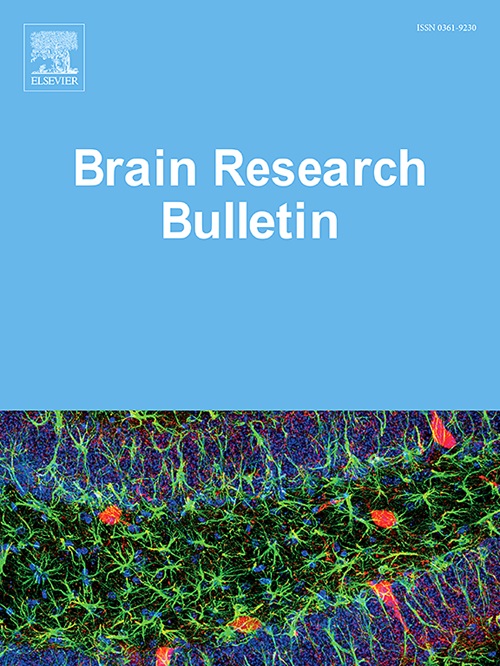淀粉样β诱导的线粒体功能障碍和脑微血管内皮细胞的内皮渗透性:右美托咪定的保护作用
IF 3.5
3区 医学
Q2 NEUROSCIENCES
引用次数: 0
摘要
术后认知功能障碍(POCD)是各类手术麻醉患者常见的并发症。新的证据表明,β-淀粉样蛋白(Aβ)的升高与 POCD 的发病机制有关。与此同时,右美托咪定(DEX)最近在降低 POCD 发生率方面显示出前景。本研究旨在阐明Aβ在诱导脑微血管内皮细胞内皮通透性中的作用及其潜在机制,并测试DEX的作用。我们证实,Aβ1-42(与 POCD 有关的常见 Aβ 形式)对 HBMECs 具有细胞毒性,可增加跨内皮通透性并诱导线粒体功能障碍,线粒体活性氧(ROS)升高、ATP 生成减少和线粒体膜电位降低就是证明。此外,Aβ1-42 还能抑制 Sirt3,加剧线粒体功能障碍。这些研究结果表明,作为一种 Sirt3 激活剂,DEX 可提供一种药理策略来缓解 Aβ1-42 相关的脑微血管内皮细胞功能障碍,并保护手术后的认知功能。本文章由计算机程序翻译,如有差异,请以英文原文为准。
Amyloid beta-induced mitochondrial dysfunction and endothelial permeability in cerebral microvascular endothelial cells: The protective role of dexmedetomidine
Postoperative cognitive dysfunction (POCD) is a common complication in patients who undergo anesthesia in different types of surgeries. Emerging evidence implicates elevated beta-amyloid (Aβ) in the pathogenesis of POCD. Meanwhile, Dexmedetomidine (DEX) has recently shown promise in reducing POCD incidence. This study aimed to elucidate the role of Aβ in inducing endothelial permeability in cerebral microvascular endothelial cells and the underlying mechanisms and testing the effects of DEX. We demonstrated that Aβ1–42, the prevalent Aβ form related to POCD, is cytotoxic to HBMECs, increasing transendothelial permeability and inducing mitochondrial dysfunction, as evidenced by elevated mitochondrial reactive oxygen species (ROS) and decreased ATP production and mitochondrial membrane potential. Furthermore, Aβ1–42 was shown to inhibit Sirt3, exacerbating mitochondrial dysfunction. Conversely, DEX was found to prevent Aβ1–42-induced mitochondrial dysfunction and permeability increases and preserved tight junction proteins in HBMECs.These findings suggest that DEX, as a Sirt3 activator, may offer a pharmacological strategy to mitigate Aβ1–42-related cerebral microvascular endothelial cell dysfunction and preserve cognitive function post-surgery.
求助全文
通过发布文献求助,成功后即可免费获取论文全文。
去求助
来源期刊

Brain Research Bulletin
医学-神经科学
CiteScore
6.90
自引率
2.60%
发文量
253
审稿时长
67 days
期刊介绍:
The Brain Research Bulletin (BRB) aims to publish novel work that advances our knowledge of molecular and cellular mechanisms that underlie neural network properties associated with behavior, cognition and other brain functions during neurodevelopment and in the adult. Although clinical research is out of the Journal''s scope, the BRB also aims to publish translation research that provides insight into biological mechanisms and processes associated with neurodegeneration mechanisms, neurological diseases and neuropsychiatric disorders. The Journal is especially interested in research using novel methodologies, such as optogenetics, multielectrode array recordings and life imaging in wild-type and genetically-modified animal models, with the goal to advance our understanding of how neurons, glia and networks function in vivo.
 求助内容:
求助内容: 应助结果提醒方式:
应助结果提醒方式:


